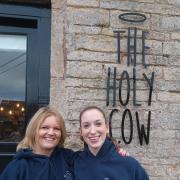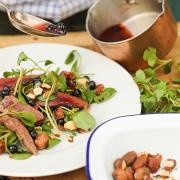Frances Wood talks to Malcolm Rigby about her decision to farm buffalo in Somerset and the extraordinary cheeses that have come about as a result.
Frances Wood talks to Malcolm Rigby about her buffalo farm in Somerset
They've been producing cheese from water buffalo milk for ten years at Alham Wood Farm near Shepton Mallet, but now, after training with some true Italian artisans, they're creating real organic mozzarella.
The initial idea of working with buffalo came when Frances Wood saw an item on breakfast TV about milking the animals in Italy. Milk quotas were a big issue at the time, curbing expansion at Alham Wood Farm, so she began to do some research on this more alternative approach. "It wasn't very easy to find out much about buffaloes," she says. "The Ministry of Agriculture went bananas at the suggestion of importing them. They said, 'Well, you can, but, but, but...' We eventually got to the end of the buts and I went to Romania and bought some. I don't know whether it was a good idea or not in retrospect. I'd probably be happily retired by now!"
In May 1997 she returned with 25 heifers and a bull; 14 of the animals calved in the first year, and the farm now has a herd of about 200. From the day they arrived the buffalo continued to be called by their Transylvanian names and even now the farm staff communicate with them in rudimentary Romanian as well as English. The names of the cheeses also come from Transylvania, Iambor being the name of the bull and Juna the word for the chief cow.
The milk that comes from the buffalo is rich, creamy and very white. It has significantly lower cholesterol than cows' milk, and even though it is low in fat it has a soft, smooth feel and a delicious clean taste. By becoming a cheesemaker, Frances is reviving an old family tradition - her grandmother was once a champion dairymaid.
"Our original range of products includes the Junas range, which I'm quite proud of because it's a lovely cheese," says Frances. "It was always claimed you couldn't have a mature buffalo cheese, but we do. Then there's Iambors, which is based on a feta-style cheese. We're also producing ricotta and that's proving to be quite a hit because it's not the stuff you get in the supermarkets. And now we've got the mozzarella itself."
Frances started producing mozzarella simply because she had a team that was enthusiastic and eager to learn a new technique, in particular the skill of 'spinning', which is an integral element of making mozzarella. Part of the learning package involved an Italian expert visiting Somerset and then one of the staff going to Italy for a week. The project has been such a success that Alham Wood Farm mozzarella has just won a bronze medal at this year's British Cheese Awards.
Frances's decision to diversify proved to be fortuitous. The buffalo arrived at the same time that the farmers' markets were developing and they have proved to be their most important outlet, initially around Somerset and then later in London. In a complex logistical operation, a driver goes up to the capital on Saturdays and Sundays to supply the various different districts: Notting Hill, Islington, Peckham, Clapham, Wimbledon, etc.
Frances describes buffalo as 'triple animals' because they provide milk, meat and work. Apparently, the Bulgarian army used them in the Second World War to pull guns. "There's a story that buffalo first came to England during the Crusades," says Frances. "It seems reasonable that if you went out to Palestine or wherever, then came back through the Balkans with your booty and your valuable warhorses, you might grab the local beast of burden to drag all your ill-gotten gains back with you. Whether the Crusaders succeeded in milking them or whether the animals just died out because there were no bulls, I don't know. Maybe there was an idea to crossbreed them with cattle - which won't work - but nobody seems to know what happened to them."
When the discussion turns to the temperament of the creatures, Frances's daughter, Grainne, who bears the most responsibility for the farm work, joins us at the kitchen table holding a bowl of chocolate Rice Krispies that are curiously dry, no milk of either the cow or buffalo variety. "Buffaloes are slow and cantankerous," Grainne says. "They're all right; you've just got to be patient. They're a lot more labour-intensive than cattle. They're slower to do things, so things take longer. As far as feeding is concerned, they are a bit more picky." Frances adds that they are curious animals and quite intelligent.
As we walk up onto the fields to take a closer look at the animals, I remember a warning I received while in Kenya: forget the lion or elephant; when it comes to ferociousness you can't beat the buffalo. Apparently, they'll chase you up a tree and then, using their swirling tail, will splash you with their acidic urine until you fall to the ground. Then they get you. But that's African buffalo, quite different from the domesticated, gentle Asian water buffalo. Nevertheless, as one starts to eyeball me with that hungry inquisitiveness, I have to fight the urge to make a run for the nearest tree. Frances explains that the odd rogue buffalo is not unknown, and these need to be removed from the herd swiftly because the roguishness can be quite catching.
So what do people who live in the area think of buffalo farming? "Local opinion varies from hating the very thought of it, to being fascinated and thinking that it lends the area a bit of kudos. There are all sorts of responses, mostly mild curiosity. The fact that they're in a valley and we have high hedges, so are not easily seen from the road, means that people can go by and not even know that they're here. Obviously, when the trees are bare, we get the odd stranger who asks, 'Are they really buffalo?'"
Frances is fairly non-committal about whether other farmers should diversify into buffalo. "We wouldn't be here if it wasn't for the buffalo," she says, "but it's not an easy option. You have to be a fairly special sort of person. I've always said, first find your market; it's no good going into it and not having a market. It's not something to go into on a whim."
For more information about Alham Wood Cheese visit www.buffalo-organics.co.uk or call 01749 880221.


























